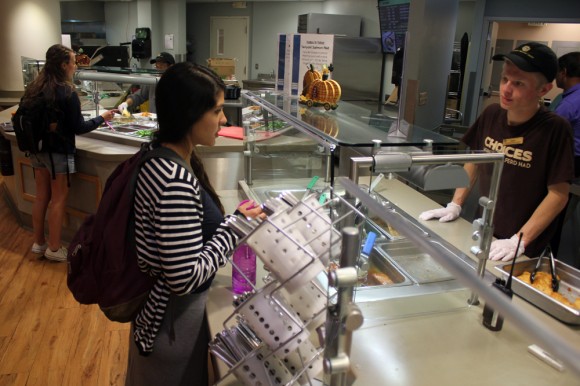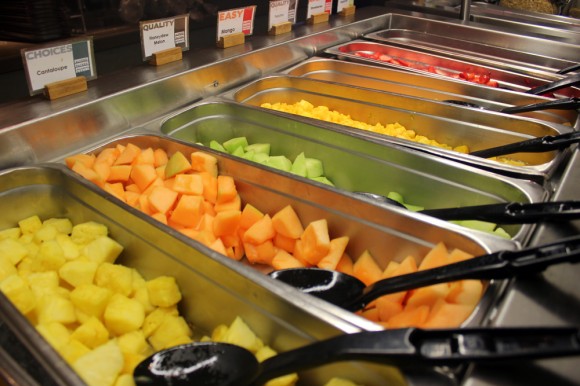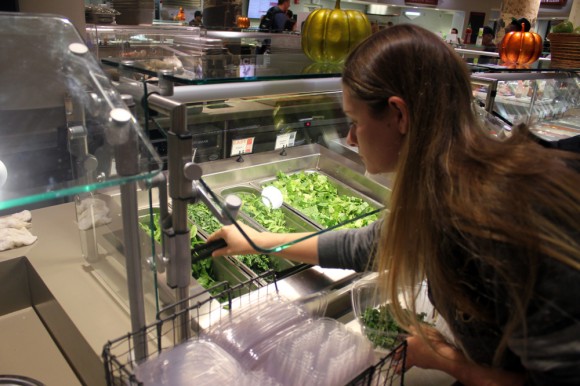
Adam Reichenbach takes a student’s order at Tabor Homestyle, the comfort and international dining option at the Alferd Packer Restaurant & Grill on Oct. 15, 2014. The different cuisines and choices make the UMC a high-traffic destination for lunch on campus. (Jade Lang/CU Independent)
CU’s Dining Services, much like the rest of the university, prioritizes the development and implementation of sustainable initiatives, but there are still institutional challenges that make environmental efficiency hard to attain. At CU, 2.2 million meals per year are served, averaging out to over 6,000 meals per day. The realities of feeding that many people set challenges that restrict the university’s abilities to fully embrace being eco-friendly.
“The term ‘sustainable’ can be broad. In food services, it means energy and water conservation, waste management, resource recovery, food sourcing and outreach and education,” said Lauren Heising, CU’s Coordinator for Sustainable Dining.
Heising said that food must be farmed, packaged, often processed and most likely transported anywhere from 25 to 2,000 miles across land or water until it reaches the mouths of consumers. The food is then prepared, and the packaging and excess food waste must be disposed of.
This process unavoidably consumes a mass amount of resources and energy, especially for an institution like CU that feeds thousands of students. Dining Services has several strategies to increase sustainability, particularly with energy and water conservation and waste management.

Trays of fruit sit at the island in the center of the Alferd Packer Restaurant & Grill. Students can make their own parfait or fill a container with their favorite fruit. (Jade Lang/CU Independent)
“Dining centers are energy hogs, so we are always looking for more efficient equipment,” said Heising, who listed dishwashing machines that use less water, spray nozzles that release smaller amounts of water, occupancy censors and compact fluorescent light bulbs as examples of CU’s more efficient equipment.
Yet there are still some roadblocks discouraging CU from fully transitioning to total sustainability in the kitchen.
“Unlike household appliances, there aren’t as many pieces of equipment available that meet [green] criteria,” said Heising.
Dealing with waste also comes with its challenges. Within dining halls, it is easier to control where waste goes, and most packaging waste from food is ultimately recycled. Heising said the waste issue arises with the several campus Grab-‘n’-Goes, where the proper disposal of packaging is up to the students. The same problem comes with the collection and disposal of food waste.
“Ecocycle comes to collect all food waste [in the dining halls], pre-consumer and post-consumer, to make compost,” said Heising. “But to reduce all campus waste is a challenge.”
The factor with the most potential to have drastic environmental benefits also comes with the greatest challenges: food sourcing. In an ideal world, CU would be able to supply only organic, locally grown and in-season products, but with factors like pricing, demand and availability, this is not an option.
“Consumers don’t necessarily want to pay for all-organic, so we can’t afford organic meats,” said Heising. “But we do have other options…The meat that we have served for the past five years is without antibiotics or hormones and is entirely vegetarian-fed.”
For serving solely in-season foods, “there is just not enough product. Being in a state like Colorado, the salad bar, for example, would be almost entirely empty from November to March,” said Heising.

Lauren Borchers opts for spinach and kale in her salad at Alferd Packer Restaurant & Grill in the UMC. Borchers enjoys the freshness of the food at Alferd Packer Grill and said the salad bar is her favorite. (Jade Lang/CU Independent)
Considering Colorado’s climate, the ability to grow a variety of fruits and vegetables is limited. With this obstacle, dining services looks to buy from local manufacturers or processors as an alternative. Although this doesn’t reduce the carbon footprint associated with transportation of food costs, it still benefits the local economy.
“We buy our bread from Boulder bakeries. So their ingredients are not locally sourced, but we are still contributing to the local Boulder community,” said Heising.
In addition to CU’s potential power in terms of producing and purchasing sustainable products, the university is also feeding the generation that will soon be responsible for the environment.
Last Thursday, the C4C dining hall hosted the event “Scrape the Plate,” where students eating at the C4C were encouraged to clean all excess scraps from the plates into compost-piled garbage bins.
“We do programs like ‘Scrape the Plate’ for the twofold purpose of outreach for consumers not to waste, and to educate the students that CU does food waste collection,” said Heising.
Heising said the responsibility to be proactive weighs on both food providers and consumers.
“Students must also educate themselves,” said Heising. “Find out where your food comes from, know what you are eating, take shorter showers, turn off your lights, find out what can be composted or recycled, be an advocate and get involved.”
Contact CU Independent staff writer Jenna Smith at Jenna.smith@colorado.edu.
